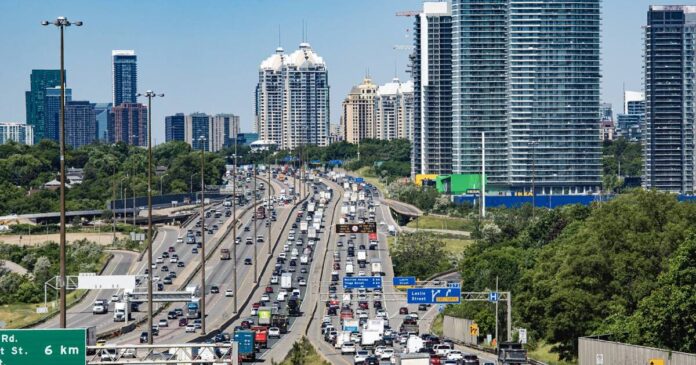Highway 413, the proposed 400-series highway designed to connect the York, Peel and Halton regions, has faced repeated backlash over its potential environmental impact, loss of farmland and biodiversity, cost and impact on Indigenous lands.
Highway 413 will pave over 2,000 acres of farmland and destroy 75 wetlands just to save commuters 30 seconds. It’s wrong & will only make the #climatecrisis worse. Ford must now #StopThe413. #harvestontariowalk #onpoli
— Norma McClinton (@norma_mcclinton) October 1, 2022
The proposed 52-kilometer freeway would stretch from Highway 400 in the east to Highway 401/407 ETR in the west. The project also includes a 4-kilometer extension of Highway 410 and a 3-kilometer extension of Highway 427, totaling 59 kilometers.
Right now, hundreds of people are walking and biking the proposed route of Highway 413 to #stopthe413. Apparently people like farms that make food better than highways that emit greenhouse gases. Who would have thought?#harvestontariowalk
— Climate Pledge Collective 💚 (@Climatepledgeco) October 1, 2022
The government of Canada recently warned the provincial government that construction of Highway 413 will be delayed if Ontario does not continue to consult with First Nations.
Just one more issue to ignore while paving Highway 413 on Indigenous land. #hypocrisy is overwhelming pic.twitter.com/6VBEqgCtbd
— Laura Feeney (@DaleJr288) September 30, 2022
The highway is currently the subject of an environmental impact assessment by both the Ontario Department of Transportation, the provincial government and the Impact Assessment Agency of Canada.
The proposed freeway hasn’t progressed much since 2021, and Ontario has spent much of this year preparing a preliminary report that the Impact Assessment Agency of Canada will eventually use to determine if a federal impact assessment is needed.
Consultations with indigenous groups are one of the most important factors that the federal agency must consider.
Heritage and Indigenous Land: Highway 413 could destroy important archeological sites as the project passes through land long-held by the Huron-Wendat people. #VoteFordOut2022
— OC@positiveprogressforall 🇺🇦 (@anyonebutford1) April 30, 2022
In documents Narwhal received, at least two First Nations, namely the Mississaugas of the Credit and Six Nations of the Grand River, have expressed disappointment with the proposed highway and the depth of consultations to date. Indigenous knowledge must also be included in the highway plans.
The proposed highway has the potential to impact Aboriginal physical and cultural heritage, including ceremonial sites, burial sites and cultural landscapes.
At a June 2021 meeting, the Mississaugas’ Credit First Nation told the Impact Assessment Agency that the consultations “felt more like an information exchange than a two-way dialogue.”
The lack of consultation so far may very well lead to federal intervention, which would result in lengthy delays for the proposed highway. To move forward, the Impact Assessment Agency of Canada is asking the province to address the concerns of affected Indigenous communities.















